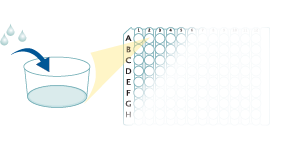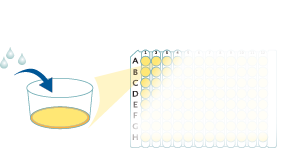Human G-CSF Quantikine HS ELISA Kit Summary
Product Summary
Precision
Cell Culture Supernates
| Intra-Assay Precision | Inter-Assay Precision | |||||
|---|---|---|---|---|---|---|
| Sample | 1 | 2 | 3 | 1 | 2 | 3 |
| n | 20 | 20 | 20 | 40 | 40 | 40 |
| Mean (pg/mL) | 50.5 | 96.8 | 217 | 50.5 | 91.4 | 207 |
| Standard Deviation | 2.1 | 3.2 | 9.7 | 4 | 7 | 10.5 |
| CV% | 4.2 | 3.3 | 4.5 | 7.9 | 7.4 | 5.1 |
Serum, EDTA Plasma, Heparin Plasma
| Intra-Assay Precision | Inter-Assay Precision | |||||
|---|---|---|---|---|---|---|
| Sample | 1 | 2 | 3 | 1 | 2 | 3 |
| n | 20 | 20 | 20 | 40 | 40 | 40 |
| Mean (pg/mL) | 60 | 113 | 243 | 62.6 | 117 | 260 |
| Standard Deviation | 4.1 | 7.7 | 12.3 | 5.2 | 7.6 | 15.3 |
| CV% | 6.8 | 6.8 | 5.1 | 8.3 | 6.5 | 5.9 |
Recovery
The recovery of G-CSF spiked to three different levels throughout the range of the assay in various matrices was evaluated.
| Sample Type | Average % Recovery | Range % |
|---|---|---|
| Cell Culture Media (n=4) | 98 | 94-104 |
| EDTA Plasma (n=4) | 91 | 84-99 |
| Heparin Plasma (n=4) | 89 | 80-100 |
| Serum (n=4) | 88 | 80-94 |
Linearity
Scientific Data
Product Datasheets
Preparation and Storage
Background: G-CSF
Granulocyte-colony stimulating factor (G-CSF) is a 24-25 kDa monomeric glycoprotein that regulates the proliferation, differentiation, and activation of hematopoietic cells in the neutrophilic granulocyte lineage. Mature human G-CSF is a 178 amino acid (aa) O-glycosylated protein that contains two intrachain disulfide bridges. In humans, alternate splicing generates a second minor isoform with a 3 aa deletion. Mouse and human G-CSF share 76% aa sequence identity, and the two proteins show species cross-reactivity. G-CSF is produced by activated monocytes and macrophages, fibroblasts, endothelial cells, astrocytes, neurons, and bone marrow stroma cells. In addition, various tumor cells express G-CSF constitutively.
Assay Procedure
Refer to the product- Prepare all reagents, standard dilutions, and samples as directed in the product insert.
- Remove excess microplate strips from the plate frame, return them to the foil pouch containing the desiccant pack, and reseal.
- Add 100 µL of Assay Diluent to each well.
- Add 100 µL of Standard, Control, or sample to each well. Cover with a plate sealer, and incubate at room temperature for 2 hours on a horizontal microplate shaker.
- Aspirate each well and wash, repeating the process 3 times for a total of 4 washes.
- Add 200 µL of Conjugate to each well. Cover with a new plate sealer, and incubate at room temperature for 2 hours on the shaker.
- Aspirate and wash 4 times.
- Add 200 µL Substrate Solution to each well. PROTECT FROM LIGHT.
- For Serum & Plasma Samples: Cover with a new plate sealer, and incubate at room temperature for 30 minutes.
For Cell Culture Supernate Samples: Cover with a new plate sealer, and incubate at room temperature for 20 minutes. - Add 50 µL of Stop Solution to each well. Read at 450 nm within 30 minutes. Set wavelength correction to 540 nm or 570 nm.





Citations for Human G-CSF Quantikine HS ELISA Kit
R&D Systems personnel manually curate a database that contains references using R&D Systems products. The data collected includes not only links to publications in PubMed, but also provides information about sample types, species, and experimental conditions.
8
Citations: Showing 1 - 8
Filter your results:
Filter by:
-
Modulating bone marrow hematopoietic lineage potential to prevent bone metastasis in breast cancer
Authors: JM Ubellacker, N Baryawno, N Severe, MJ DeCristo, J Sceneay, JN Hutchinson, MT Haider, CS Rhee, Y Qin, WM Gregory, AC Garrido-Ca, I Holen, JE Brown, RE Coleman, DT Scadden, SS McAllister
Cancer Res., 2018-07-31;0(0):.
Species: Human
Sample Types: Plasma
-
Differential expression of cell cycle and WNT pathway-related genes accounts for differences in the growth and differentiation potential of Wharton's jelly and bone marrow-derived mesenchymal stem cells
Authors: AK Batsali, C Pontikoglo, D Koutroulak, KI Pavlaki, A Damianaki, I Mavroudi, K Alpantaki, E Kouvidi, G Kontakis, HA Papadaki
Stem Cell Res Ther, 2017-04-26;8(1):102.
Species: Human
Sample Types: Cell Culture Supernates
-
Phase I trial of combretastatin A4 phosphate (CA4P) in combination with bevacizumab in patients with advanced cancer.
Clin. Cancer Res., 2012-05-29;18(12):3428-39.
Species: Human
Sample Types: Plasma
-
Endogenous granulocyte colony-stimulating factor: a biomarker in acute ischemic stroke.
Authors: Yu SC, Kuo CL, Huang CS, Chang CS, Wu SL, Su SL, Liu CS
Biomarkers, 2012-03-23;17(4):319-24.
Species: Human
Sample Types: Plasma
-
Rapid chemotherapy-induced acute endothelial progenitor cell mobilization: implications for antiangiogenic drugs as chemosensitizing agents.
Authors: Shaked Y, Henke E, Roodhart JM, Mancuso P, Langenberg MH, Colleoni M, Daenen LG, Man S, Xu P, Emmenegger U, Tang T, Zhu Z, Witte L, Strieter RM, Bertolini F, Voest EE, Benezra R, Kerbel RS
Cancer Cell, 2008-09-09;14(3):263-73.
Species: Human
Sample Types: Plasma
-
Duffy (Fy), DARC, and neutropenia among women from the United States, Europe and the Caribbean.
Authors: Grann VR, Ziv E, Joseph CK, Neugut AI, Wei Y, Jacobson JS, Horwitz MS, Bowman N, Beckmann K, Hershman DL
Br. J. Haematol., 2008-08-15;143(2):288-93.
Species: Human
Sample Types: Plasma
-
Neutropenia in 6 ethnic groups from the Caribbean and the U.S.
Authors: Grann VR, Bowman N, Joseph C, Wei Y, Horwitz MS, Jacobson JS, Santella RP, Hershman DL
Cancer, 2008-08-15;113(4):854-60.
Species: Human
Sample Types: Plasma
-
Duffy antigen modifies the chemokine response in human endotoxemia.
Authors: Mayr FB, Spiel AO, Leitner JM, Firbas C, Kliegel T, Jilma-Stohlawetz P, Derendorf H, Jilma B
Crit. Care Med., 2008-01-01;36(1):159-65.
Species: Human
Sample Types: Plasma
FAQs
No product specific FAQs exist for this product, however you may
View all ELISA FAQsELISA Controls
Reviews for Human G-CSF Quantikine HS ELISA Kit
There are currently no reviews for this product. Be the first to review Human G-CSF Quantikine HS ELISA Kit and earn rewards!
Have you used Human G-CSF Quantikine HS ELISA Kit?
Submit a review and receive an Amazon gift card.
$25/€18/£15/$25CAN/¥75 Yuan/¥2500 Yen for a review with an image
$10/€7/£6/$10 CAD/¥70 Yuan/¥1110 Yen for a review without an image






